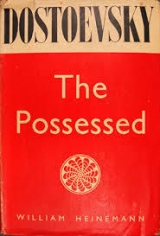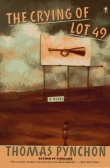
Текст книги "The Possessed"
Автор книги: Федор Достоевский
сообщить о нарушении
Текущая страница: 28 (всего у книги 49 страниц)
“I refused definitely to print them.”
“Well, not definitely. You wrote that you couldn't, but you didn't explain for what reason. 'I can't' doesn't mean' I don't want to.' It might be supposed that you were simply unable through circumstances. That was how they took it, and considered that you still meant to keep up your connection with the society, so that they might have entrusted something to you again and so have compromised themselves. They say here that you simply meant to deceive them, so that you might betray them when you got hold of something important. I have defended you to the best of my powers, and have shown your brief note as evidence in your favour. But I had to admit on rereading those two lines that they were misleading and not conclusive.”
“You kept that note so carefully then?”
“My keeping it means nothing; I've got it still.”
“Well, I don't care, damn it!” Shatov cried furiously. “Your fools may consider that I've betrayed them if they like –what is it to me? I should like to see what you can do to me?”
“Your name would be noted, and at the first success of the revolution you would be hanged.”
“That's when you get the upper hand and dominate Russia?”
“You needn't laugh. I tell you again, I-stood up for you. Anyway, I advise you to turn up to-day. Why waste words through false pride? Isn't it better to part friends? In any case you'll have to give up the printing press and the old type and papers – that's what we must talk about.”
“I'll come,” Shatov muttered, looking down thoughtfully.
Pyotr Stepanovitch glanced askance at him from his place.
“Will Stavrogin be there?” Shatov asked suddenly, raising his head.
“He is certain to be.”
“Ha ha!”
Again they were silent for a minute. Shatov grinned disdainfully and irritably.
“And that contemptible 'Noble Personality' of yours, that I wouldn't print here. Has it been printed?” he asked.
“Yes.”
“To make the schoolboys believe that Herzen himself had written it in your album?”
“Yes, Herzen himself.”
Again they were silent for three minutes. At last Shatov got up from the bed.
“Go out of my room; I don't care to sit with you.”
“I'm going,” Pyotr Stepanovitch brought out with positive alacrity, getting up at once. “Only one word: Kirillov is quite alone in the lodge now, isn't he, without a servant?”
“Quite alone. Get along; I can't stand being in the same room with you.”
“Well, you are a pleasant customer now!” Pyotr Stepanovitch reflected gaily as he went out into the street, “and you will be pleasant this evening too, and that just suits me; nothing better could be wished, nothing better could be wished! The Russian God Himself seems helping me.”
VII
He had probably been very busy that day on all sorts of errands and probably with success, which was reflected in the self-satisfied expression of his face when at six o'clock that evening he turned 'up at Stavrogin's. But he was not at once admitted: Stavrogin had just locked himself in the study with Mavriky Nikolaevitch. This news instantly made Pyotr Stepanovitch anxious. He seated himself close to the study door to wait for the visitor to go away. He could hear conversation but could not catch the words. The visit did not last long; soon he heard a noise, the sound of an extremely loud and abrupt voice, then the door opened and Mavriky Nikolaevitch came out with a very pale face. He did not notice Pyotr Stepanovitch, and quickly passed by. Pyotr Stepanovitch instantly ran into the study.
I cannot omit a detailed account of the very brief interview that had taken place between the two “rivals”– an interview which might well have seemed impossible under the circumstances, but which had yet taken place..
This is how it had come about. Nikolay Vsyevolodovitch had been enjoying an after-dinner nap on the couch in his study when Alexey Yegorytch had announced the unexpected visitor. Hearing the name, he had positively leapt up, unwilling to believe it. But soon a smile gleamed on his lips – a smile of haughty triumph and at the same time of a blank, incredulous wonder. The visitor, Mavriky Nikolaevitch, seemed struck by the expression of that smile as he came in; anyway, he stood still in the middle of the room as though uncertain whether to come further in or to turn back. Stavrogin succeeded at once in transforming the expression of his face, and with an air of grave surprise took a step towards him. The visitor did not take his outstretched hand, but awkwardly moved a chair and, not uttering a word, sat down without waiting for his host to do so. Nikolay Vsyevolodovitch sat down on the sofa facing him obliquely and, looking at Mavriky Nikolaevitch, waited in silence.
“If you can, marry Lizaveta Nikolaevna,” Mavriky Nikolaevitch brought out suddenly at last, and what was most curious, it was impossible to tell from his tone whether it was an entreaty, a recommendation, a surrender, or a command.
Stavrogin still remained silent, but the visitor had evidently said all he had come to say and gazed at him persistently, waiting for an answer.
“If I am not mistaken (but it's quite certain), Lizaveta Nikolaevna is already betrothed to you,” Stavrogin said at last.
“Promised and betrothed,” Mavriky Nikolaevitch assented firmly and clearly.
“You have . . . quarrelled? Excuse me, Mavriky Nikolaevitch.”
“No, she 'loves and respects me'; those are her words. Her words are more precious than anything.”
“Of that there can be no doubt.”
“But let me tell you, if she were standing in the church at her wedding and you were to call her, she'd give up me and every one and go to you.”
“From the wedding?”
“Yes, and after the wedding.”
“Aren't you making a mistake?”
“No. Under her persistent, sincere, and intense hatred for you love is flashing out at every moment . . . and madness . . . the sincerest infinite love and . . . madness! On the contrary, behind the love she feels for me, which is sincere too, every moment there are flashes of hatred . . . the most intense hatred! I could never have fancied all these transitions . . . before.”
“But I wonder, though, how could you come here and dispose of the hand of Lizaveta Nikolaevna? Have you the right to do so? Has she authorised you?”
Mavriky Nikolaevitch frowned and for a minute he looked down.
“That's all words on your part,” he brought out suddenly, “words of revenge and triumph; I am sure you can read between the lines, and is this the time for petty vanity? Haven't you satisfaction enough? Must I really dot my i'sand go into it all? Very well, I will dot my i's,if you are so anxious for my humiliation. I have no right, it's impossible for me to be authorised; Lizaveta Nikolaevna knows nothing about it and her betrothed has finally lost his senses and is only fit for a madhouse, and, to crown everything, has come to tell you so himself. You are the only man in the world who can make her happy, and I am the one to make her unhappy. You are trying to get her, you are pursuing her, but – I don't know why – you won't marry her. If it's because of a lovers' quarrel abroad and I must be sacrificed to end it, sacrifice me. She is too unhappy and I can't endure it. My words are not a sanction, not a prescription, and so it's no slur on your pride. If you care to take my place at the altar, you can do it without any sanction from me, and there is no ground for me to come to you with a mad proposal, especially as our marriage is utterly impossible after the step I am taking now. I cannot lead her to the altar feeling myself an abject wretch. What I am doing here and my handing her over to you, perhaps her bitterest foe, is to my mind something so abject that I shall never get over it.”
“Will you shoot yourself on our wedding day?”
“No, much later. Why stain her bridal dress with my blood? Perhaps I shall not shoot myself at all, either now or later.”
“I suppose you want to comfort me by saying that?”
“You? What would the blood of one more mean to you?” He turned pale and his eyes gleamed. A minute of silence followed.
“Excuse me for the questions I've asked you,” Stavrogin began again; “some of them I had no business to ask you, but one of them I think I have every right to put to you. Tell me, what facts have led you to form a conclusion as to my feelings for Lizaveta Nikolaevna? I mean to a conviction of a degree of feeling on my part as would justify your coming here . . . and risking such a proposal.”
“What?” Mavriky Nikolaevitch positively started. “Haven't you been trying to win her? Aren't you trying to win her, and don't you want to win her?”
“Generally speaking, I can't speak of my feeling for this woman or that to a third person or to anyone except the woman herself. You must excuse it, it's a constitutional peculiarity. But to make up for it, I'll tell you the truth about everything else; I am married, and it's impossible for me either to marry or to try 'to win' anyone.”
Mavriky Nikolaevitch was so astounded that he started back in his chair and for some time stared fixedly into Stavrogin's face.
“Only fancy, I never thought of that,” he muttered. “You said then, that morning, that you were not married . . . and so I believed you were not married.”
He turned terribly pale; suddenly he brought his fist down on the table with all his might.
“If after that confession you don't leave Lizaveta Nikolaevna alone, if you make her unhappy, I'll kill you with my stick like a dog in a ditch!”
He jumped up and walked quickly out of the room. Pyotr Stepanovitch, running in, found his host in a most unexpected frame of mind.
“Ah, that's you!” Stavrogin laughed loudly; his laughter seemed to be provoked simply by the appearance of Pyotr Stepanovitch as he ran in with such impulsive curiosity.
“Were you listening at the door? Wait a bit. What have you come about? I promised you something, didn't I? Ah, bah! I remember, to meet 'our fellows.' Let us go. I am delighted. You couldn't have thought of anything more appropriate.” He snatched up his hat and they both went at once out of the house.
“Are you laughing beforehand at the prospect of seeing 'our fellows'?” chirped gaily Pyotr Stepanovitch, dodging round him with obsequious alacrity, at one moment trying to walk beside his companion on the narrow brick pavement and at the next running right into the mud of the road; for Stavrogin walked in the middle of the pavement without observing that he left no room for anyone else.
“I am not laughing at all,” he answered loudly and gaily; “on the contrary, I am sure that you have the most serious set of people there.”
“'Surly dullards,' as you once deigned to express it.”
“Nothing is more amusing sometimes than a surly dullard.”
“Ah, you mean Mavriky Nikolaevitch '? I am convinced he came to give up his betrothed to you, eh? I egged him on to do it, indirectly, would you believe it? And if he doesn't give her up, we'll take her, anyway, won't we – eh?”
Pyotr Stepanovitch knew no doubt that he was running some risk in venturing on such sallies, but when he was excited he preferred to risk anything rather than to remain in uncertainty. Stavrogin only laughed.
“You still reckon you'll help me?” he asked. “If you call me. But you know there's one way, and the best one.”
“Do I know your way?”
“Oh no, that's a secret for the time. Only remember, a secret has its price.”
“I know what it costs,” Stavrogin muttered to himself, but he restrained himself and was silent.
“What it costs? What did you say?” Pyotr Stepanovitch was startled.
“I said, 'Damn you and your secret!' You'd better be telling me who will be there. I know that we are going to a name-day party, but who will be there?”
“Oh, all sorts! Even Kirillov.”
“All members of circles?”
“Hang it all, you are in a hurry! There's not one circle formed yet.”
“How did you manage to distribute so many manifestoes then?”
“Where we are going only four are members of the circle. The others on probation are spying on one another with jealous eagerness, and bring reports to me. They are a trustworthy set. It's all material which we must organise, and then we must clear out. But you wrote the rules yourself, there's no need to explain.”
“Are things going badly then? Is there a hitch?”
“Going? Couldn't be better. It will amuse you: the first thing which has a tremendous effect is giving them titles. Nothing has more influence than a title. I invent ranks and duties on purpose; I have secretaries, secret spies, treasurers, presidents, registrars, their assistants – they like it awfully, it's taken capitally. Then, the next force is sentimentalism, of course. You know, amongst us socialism spreads principally through sentimentalism. But the trouble is these lieutenants who bite; sometimes you put your foot in it. Then come the out-and-out rogues; well, they are a good sort, if you like, and sometimes very useful; but they waste a lot of one's time, they want incessant looking after. And the most important force of all – the cement that holds everything together – is their being ashamed of having an opinion of their own. That is a force! And whose work is it, whose precious achievement is it, that not one idea of their own is left in their heads! They think originality a disgrace.”
“If so, why do you take so much trouble?”
“Why, if people lie simply gaping at every one, how can you resist annexing them? Can you seriously refuse to believe in the possibility of success? Yes, you have the faith, but one wants will. It's just with people like this that success is possible. I tell you I could make them go through fire; one has only to din it into them that they are not advanced enough. The fools reproach me that I have taken in every one here over the central committee and 'the innumerable branches.' You once blamed me for it yourself, but where's the deception? You and I are the central committee and there will be as many branches as we like.”
“And always the same sort of rabble!”
“Raw material. Even they will be of use.”
“And you are still reckoning on me?”
“You are the chief, you are the head; I shall only be a subordinate, your secretary. We shall take to our barque, you know; the oars are of maple, the sails are of silk, at the helm sits a fair maiden, Lizaveta Nikolaevna . . . hang it, how does it go in the ballad?”
“He is stuck,” laughed Stavrogin. “No, I'd better give you my version. There you reckon on your fingers the forces that make up the circles. All that business of titles and sentimentalism is a very good cement, but there is something better; persuade four members of the circle to do for a fifth on the pretence that he is a traitor, and you'll tie them all together with the blood they've shed as though it were a knot. They'll be your slaves, they won't dare to rebel or call you to account. Ha ha ha! “
“But you . . . you shall pay for those words,” Pyotr Stepanovitch thought to himself, “and this very evening, in fact. You go too far.”
This or something like this must have been Pyotr Stepanovitch's reflection. They were approaching Virginsky's house.
“You've represented me, no doubt, as a member from abroad, an inspector in connection with the Internationale?” Stavrogin asked suddenly.
“No, not an inspector; you won't be an inspector; but you are one of the original members from abroad, who knows the most important secrets – that's your role. You are going to speak, of course?”
“What's put that idea into your head?”
“Now you are bound to speak.”
Stavrogin positively stood still in the middle of the street in surprise, not far from a street lamp. Pyotr Stepanovitch faced his scrutiny calmly and defiantly. Stavrogin cursed and went on.
“And are you going to speak?” he suddenly asked Pyotr Stepanovitch.
“No, I am going to listen to yon.”
“Damn you, you really are giving me an idea?”
“What idea?” Pyotr Stepanovitch asked quickly.
“Perhaps I will speak there, but afterwards I will give you a hiding – and a sound one too, you know.”
“By the way, I told Karmazinov this morning that you said he ought to be thrashed, and not simply as a form but to hurt, as they flog peasants.”
“But I never said such a thing; ha ha!”
“No matter. Se non e vero...”
“Well, thanks. I am truly obliged.”
“And another thing. Do you know, Karmazinov says that the essence of our creed is the negation of honour, and that by the open advocacy of a right to be dishonourable a Russian can be won over more easily than by anything.”
“An excellent saying! Golden words!” cried Stavrogin. “He's hit the mark there! The right to dishonour – why, they'd all flock to us for that, not one would stay behind! And listen, Verhovensky, you are not one of the higher police, are you?”
“Anyone who has a question like that in his mind doesn't utter it,”
“I understand, but we are by ourselves.”
“No, so far I am not one of the higher police. Enough, here we are. Compose your features, Stavrogin; I always do mine when I go in. A gloomy expression, that's all, nothing more is wanted; it's a very simple business.”
Last updated on Wed Jan 12 09:26:22 2011 for eBooks@Adelaide.
The Possessed, by Fyodor Dostoyevsky
Chapter VII. A Meeting
VIRGINSKY LIVED IN HIS OWN house, or rather his wife's, in Muravyin Street. It was a wooden house of one story, and there were no lodgers in it: On the pretext of Virginsky's-name-day party, about fifteen guests were assembled; but the entertainment was not in the least like an ordinary provincial name-day party. From the very beginning of their married life the husband and wife had agreed once for all that it was utterly stupid to invite friends to celebrate name-days, and that “there is nothing to rejoice about in fact.” In a few years they had succeeded in completely cutting themselves off from all society. Though he was a man of some ability, and by no means very poor, he somehow seemed to every one an eccentric fellow who was fond of solitude, and, what's more, “stuck up in conversation.” Madame Virginsky was a midwife by profession – and by that very fact was on the lowest rung of the social ladder, lower even than the priest's wife in spite of her husband's rank as an officer. But she was conspicuously lacking in the humility befitting her position. And after her very stupid and unpardonably open liaison on principle with Captain Lebyadkin, a notorious rogue, even the most indulgent of our ladies turned away from her with marked contempt. But Madame Virginsky accepted all this as though it were what she wanted. It is remarkable that those very ladies applied to Arina Prohorovna (that is, Madame Virginsky) when they were in an interesting condition, rather than to any one of the other three accoucheuses of the town. She was sent for even by country families living in the neighbourhood, so great was the belief in her knowledge, luck, and skill in critical cases. It ended in her practising only among the wealthiest ladies; she was greedy of money. Feeling her power to the full, she ended by not putting herself out for anyone. Possibly on purpose, indeed, in her practice in the best houses she used to scare nervous patients by the most incredible and nihilistic disregard of good manners, or by jeering at “everything holy,” at the very time when “everything holy” might have come in most useful. Our town doctor, Rozanov – he too was an accoucheur – asserted most positively that on one occasion when a patient in labour was crying out and calling on the name of the Almighty, a free-thinking sally from Arina Prohorovna, fired off like a pistol-shot, had so terrifying an effect on the patient that it greatly accelerated her delivery.
But though she was a nihilist, Madame Virginsky did not, when occasion arose, disdain social or even old-fashioned superstitions and customs if they could be of any advantage to herself. She would never, for instance, have stayed away from a baby's christening, and always put on a green silk dress with a train and adorned her chignon with curls and ringlets for such events, though at other times she positively revelled in slovenliness. And though during the ceremony she always maintained “the most insolent air,” so that she put the clergy to confusion, yet when it was over she invariably handed champagne to the guests (it was for that that she came and dressed up), and it was no use trying to take the glass without a contribution to her “porridge bowl.”
The guests who assembled that evening at Virginsky's (mostly men) had a casual and exceptional air. There was no supper nor cards. In the middle of the large drawing-room, which was papered with extremely old blue paper, two tables had been put together and covered with a large though not quite clean table-cloth, and on them two samovars were boiling. The end of the table was taken up by a huge tray with twenty-five glasses on it and a basket with ordinary French bread cut into a number of slices, as one sees it in genteel boarding-schools for boys or girls. The tea was poured out by a maiden lady of thirty, Arina Prohorovna's sister, a silent and malevolent creature, with flaxen hair and no eyebrows, who shared her sister's progressive ideas and was an object of terror to Virginsky himself in domestic life. There were only three ladies in the room: the lady of the house, her eyebrowless sister, and Virginsky's sister, a girl who had just arrived from Petersburg. Arina Prohorovna, a good-looking and buxom woman of seven-and-twenty, rather dishevelled, in an everyday greenish woollen dress, was sitting scanning the guests with her bold eyes, and her look seemed in haste to say, “You see I am not in the least afraid of anything.” Miss Virginsky, a rosy-cheeked student and a nihilist, who was also good-looking, short, plump and round as a little ball, had settled herself beside Arina Prohorovna, almost in her travelling clothes. She held a roll of paper in her hand, and scrutinised the guests with impatient and roving eyes. Virginsky himself was rather unwell that evening, but he came in and sat in an easy chair by the tea-table. All the guests were sitting down too, and the orderly way in which they were ranged on chairs suggested a meeting. Evidently all were expecting something and were filling up the interval with loud but irrelevant conversation. When Stavrogin and Verhovensky appeared there was a sudden hush.
But I must be allowed to give a few explanations to make things clear.
I believe that all these people had come together in the agreeable expectation of hearing something particularly interesting, and had notice of it beforehand. They were the flower of the reddest Radicalism of our ancient town, and had been carefully picked out by Virginsky for this “meeting.” I may remark, too, that some of them (though not very many) had never visited him before. Of course most of the guests had no clear idea why they had been summoned. It was true that at that time all took Pyotr Stepanovitch for a fully authorised emissary from abroad; this idea had somehow taken root among them at once and naturally flattered them. And yet among the citizens assembled ostensibly to keep a name-day, there were some who had been approached with definite proposals. Pyotr Verhovensky had succeeded in getting together a “quintet” amongst us like the one he had already formed in Moscow and, as appeared later, in our province among the officers. It was said that he had another in X province. This quintet of the elect were sitting now at the general table, and very skilfully succeeded in giving themselves the air of being quite ordinary people, so that no one could have known them. They were – since it is no longer a secret – first Liputin, then Virginsky himself, then Shigalov (a gentleman with long ears, the brother of Madame Virginsky), Lyamshin, and lastly a strange person called Tolkatchenko, a man of forty, who was famed for his vast knowledge of the people, especially of thieves and robbers. He used to frequent the taverns on purpose (though not only with the object of studying the people), and plumed himself on his shabby clothes, tarred boots, and crafty wink and a flourish of peasant phrases. Lyamshin had once or twice brought him to Stepan Trofimovitch's gatherings, where, however, he did not make a great sensation. He used to make his appearance in the town from time to time, chiefly when he was out of a job; he was employed on the railway.
Every one of these fine champions had formed this first group in the fervent conviction that their quintet was only one of hundreds and thousands of similar groups scattered all over Russia, and that they all depended on some immense central but secret power, which in its turn was intimately connected with the revolutionary movement all over Europe. But I regret to say that even at that time there was beginning to be dissension among them. Though they had ever since the spring been expecting Pyotr Verhovensky, whose coming had been heralded first by Tolkatchenko and then by the arrival of Shigalov, though they had expected extraordinary miracles from him, and though they had responded to his first summons without the slightest criticism, yet they had no sooner formed the quintet than they all somehow seemed to feel insulted; and I really believe it was owing to the promptitude with which they consented to join. They had joined, of course, from a not ignoble feeling of shame, for fear people might say afterwards that they had not dared to join; still they felt Pyotr Verhovensky ought to have appreciated their heroism and have rewarded it by telling them some really important bits of news at least. But Verhovensky was not at all inclined to satisfy their legitimate curiosity, and told them nothing but what was necessary; he treated them in general with great sternness and even rather casually. This was positively irritating, and Comrade Shigalov was already egging the others on to insist on his “explaining himself,” though, of course, not at Virginsky's, where so many outsiders were present.
I have an idea that the above-mentioned members of the first quintet were disposed to suspect that among the guests of Virginsky's that evening some were members of other groups, unknown to them, belonging to the same secret organisation and founded in the town by the same Verhovensky; so that in fact all present were suspecting one another, and posed in various ways to one another, which gave the whole party a very perplexing and even romantic air. Yet there were persons present who were beyond all suspicion. For instance, a major in the service, a near relation of Virginsky, a perfectly innocent person who had not been invited but had come of himself for the name-day celebration, so that it was impossible not to receive him. But Virginsky was quite unperturbed, as the major was “incapable of betraying them”; for in spite of his stupidity he had all his life been fond of dropping in wherever extreme Radicals met; he did not sympathise with their ideas himself, but was very fond of listening to them. What's more, he had even been compromised indeed. It had happened in his youth that whole bundles of manifestoes and of numbers of The flellhad passed through his hands, and although he had been afraid even to open them, yet he would have considered it absolutely contemptible to refuse to distribute them – and there are such people in Russia even to this day.
The rest of the guests were either types of honourable amour-propre crushed and embittered, or types of the generous impulsiveness of ardent youth. There were two or three teachers, of whom one, a lame man of forty-five, a master in the high school, was a very malicious and strikingly vain person; and two or three officers. Of the latter, one very young artillery officer who had only just come from a military training school, a silent lad who had not yet made friends with anyone, turned up now at Virginsky's with a pencil in his hand, and, scarcely taking any part in the conversation, continually made notes in his notebook. Everybody saw this, but every one pretended not to. There was, too, an idle divinity student who had helped Lyamshin to put indecent photographs into the gospel-woman's pack. He was a solid youth with a free-and-easy though mistrustful manner, with an unchangeably satirical smile, together with a calm air of triumphant faith in his own perfection. There was also present, I don't know why, the mayor's son, that unpleasant and prematurely exhausted youth to whom I have referred already in telling the story of the lieutenant's little wife. He was silent the whole evening. Finally there was a very enthusiastic and tousle-headed schoolboy of eighteen, who sat with the gloomy air of a young man whose dignity has been wounded, evidently distressed by his eighteen years. This infant was already the head of an independent group of conspirators which had been formed in the highest class of the gymnasium, as it came out afterwards to the surprise of every one.
I haven't mentioned Shatov. He was there at the farthest corner of the table, his chair pushed back a little out of the row. He gazed at the ground, was gloomily silent, refused tea and bread, and did not for one instant let his cap go out of his hand, as though to show that he was not a visitor, but had come on business, and when he liked would get up and go away. Kirillov was not far from him. He, too, was very silent, but he did not look at the ground; on the contrary, he scrutinised intently every speaker with his fixed, lustreless eyes, and listened to everything without the slightest emotion or surprise. Some of the visitors who had never seen him before stole thoughtful glances at him. I can't say whether Madame Virginsky knew anything about the existence of the quintet. I imagine she knew everything and from her husband. The girl-student, of course, took no part in anything; but she had an anxiety of her own: she intended to stay only a day or two and then to go on farther and farther from one university town to another “to show active sympathy with the sufferings of poor students and to rouse them to protest.” She was taking with her some hundreds of copies of a lithographed appeal, I believe of her own composition. It is remarkable that the schoolboy conceived an almost murderous hatred for her from the first moment, though he saw her for the first time in his life; and she felt the same for him. The major was her uncle, and met her to-day for the first time after ten years. When Stavrogin and Verhovensky came in, her cheeks were as red as cranberries: she had just quarrelled with her uncle over his views on the woman question.








